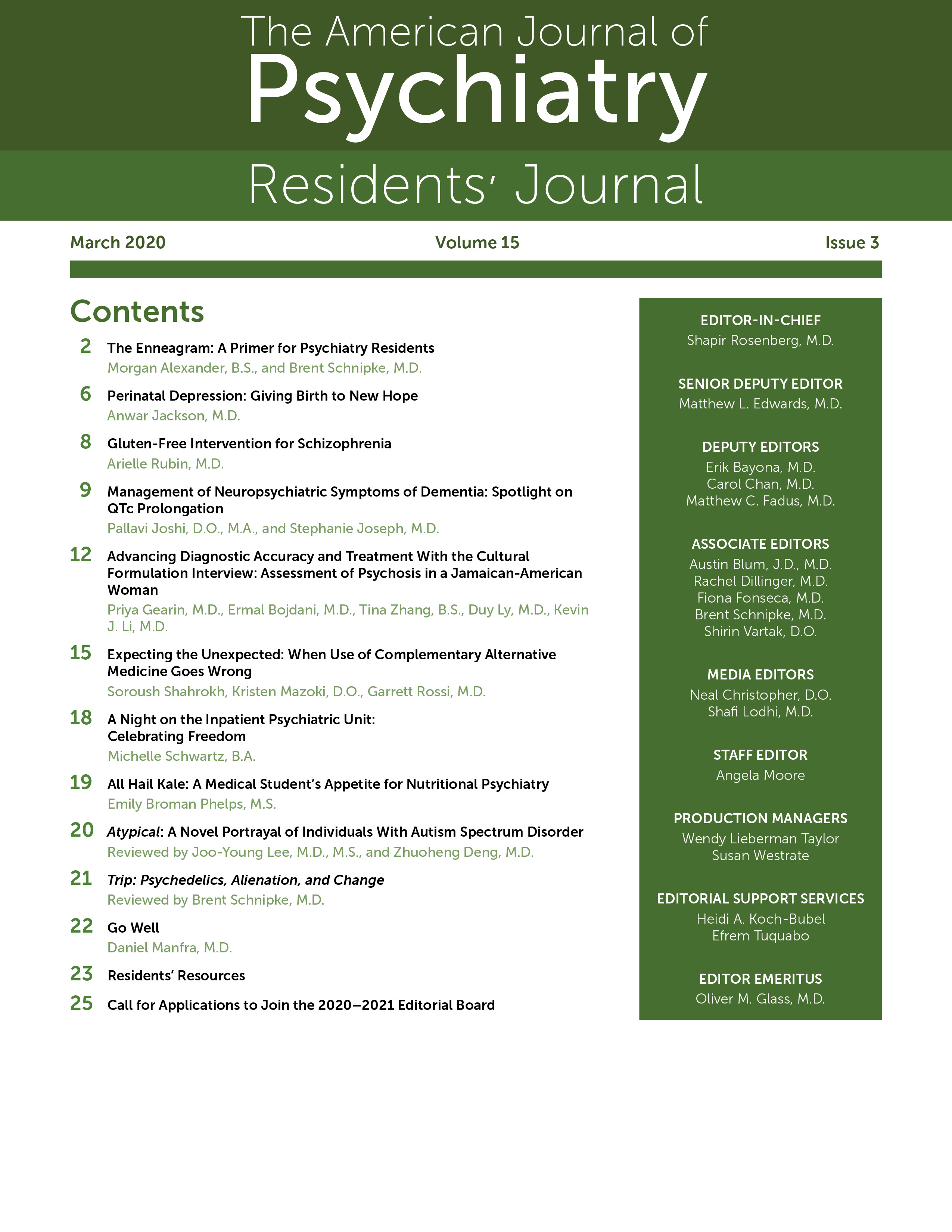Growing up, holiday dinners were very important to me, and Passover was my favorite. But this past year's Seder was one of the most profound experiences of all. As a third-year medical student, I was doing my psychiatry rotation in a state mental hospital as Passover approached. There were three Jewish women on the ward; all had schizophrenia, and one was the child of a Holocaust survivor. The mere mention of Passover had them reciting the Haggadah—from memory. I discussed the idea of creating a Seder with Dr. Kanofsky, an attending psychiatrist on the unit, and a fellow student. We would hold the event before Passover and keep it shorter than a traditional Seder to ensure that the patients' needs were primary. We cleared the idea with the hospital, including permission to be present on the unit after hours, and received foods and other materials from Chabad. We were set.
But I was nervous. Would the concept of celebrating freedom with a Seder feel hollow and mocking in the context of an inpatient psychiatric unit? And would this experience interfere with recovery? Some of these women have religious delusions and hallucinations of levitating water. I was wary that the Seder would reaffirm these beliefs. Yet, I also know that religious beliefs are used to cope with the extreme stress that mental illness can cause. Fallot (
1) described how the spiritual needs of patients with severe mental disorders can be addressed as part of their treatment. In addition, social inclusion is associated with enhanced physical and emotional well-being, and people with significant mental illness are among the most excluded in society (
2). I wanted to create an experience that followed medical guidelines, yet embraced compassion and kinship.
And so, I proceeded. I asked the Jewish women whom they would like to invite. One of them musically recanted, "Let all who are hungry come and eat," a direct quote from the Haggadah (
3). Granting her request, we invited the entire floor.
The night arrived. Together, we decorated the room with colorful flowers and set the table before sunset. We prepared to take ourselves back in time, to revisit the very night our ancestors were liberated. But the first song began, and the patients were emotional and exhibiting distress—crying, twitching, and screaming. Still, we proceeded to the Four Questions ("Ma Nishtana")—the text that asks, "Why is this night different?" Immediately, the atmosphere changed.
The questions of "why" seemed to open patients' minds. One asked why children traditionally ask the questions. Another responded by citing Maimonides, a 12th century philosopher, stating that a pupil can sharpen the mind of a teacher. Together we concluded that we learn from everyone.
A non-Jewish patient asked why the Jews are the "chosen people," to which we responded that tonight we all were chosen—choosing to embrace and learn from one another. Another patient showed off his "Hebrew," speaking in a dialect that was his own, yet seemed to be understood by the other patients. Patients shared insights that they had heard in years past; one explained that Matzah symbolizes the road to freedom, and another stated that Matzah is the food of affliction. A third explained that this duality signified the struggle and the complexity of our lives.
The patients shared poignant memories, too. They recalled gefilte fish recipes and a unique tradition of including an orange on the Seder plate to represent marginalized communities. I was inspired by the words and actions of all present. We were in a psychiatric unit, yet never felt freer. We felt the freedom of transcendence—of pure joy, beyond physical and mental boundaries. Psychotic behaviors melted away; something about the Haggadah felt safe and supportive.
It was a night I'll never forget. We came together, reaching a place that unified and uplifted everyone. I learned on the psychiatry clerkship about the sense of isolation that psychotic individuals feel. Not only did we read about such isolation in first-hand accounts, but we also saw it on the ward, where patients struggling with psychotic symptoms isolated themselves in their rooms, refused to attend community meetings, and had few friends.
The Seder provided asylum from fear and stigma, a validating oasis of emotional expression and empathic listening for those with and without a shared religious background. Above all, this evening demonstrated the importance of community, no matter the limitations of illness. After all, as I was recently reminded, the Haggadah does say: "Let all who are hungry come and eat."
